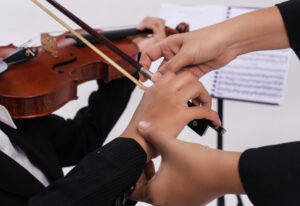When families search for private lessons, the most common question they’re asking is: what are the qualities of a violin instructor that truly matter? As beginner-focused violin teachers, we believe it comes down to three core attributes: technical expertise, personal connection, and adaptive teaching. These qualities lay the foundation for confidence, progression, and joy in learning.
1. Technical Expertise and Musical Training
To nurture solid violin foundations, an instructor should:
-
Hold a music degree or equivalent study in violin
-
Demonstrate reliable tuning, posture, and fingering techniques
-
Know how to identify and correct posture issues, intonation mistakes, and bowing habits
Instructors with a strong background ensure beginners develop correct habits early—which saves frustration and fosters enjoyment later on.
2. Connection and Communication
We’ve found that students make the best progress when there’s genuine rapport. Look for teachers who:
-
Listen to student interests and concerns
-
Encourage through praise and positive reinforcement
-
Adapt explanations to the student’s learning style
A nurturing learning environment is especially effective for young beginners—read more on creating that environment in our post on motivating kids to practice.
3. Adaptability in Teaching Style
Every student learns differently, and a great violin teacher:
-
Slides easily between games, writing, playing, and listening activities
-
Adjusts pacing when pieces feel too easy or too hard
-
Incorporates fun techniques like rhythm games, simple melodies, or duet play
This flexibility keeps students motivated and enthusiastic as their interests and skills evolve.
How These Qualities Impact Beginner Progress
At lessons, these qualities mean:
-
Secure technical habits that prevent injury and build accuracy
-
Greater confidence as students feel heard and supported
-
Consistent engagement, leading to steady growth and excitement
FAQ
Q: How do I evaluate an instructor’s expertise?
Ask about their training, certifications, and teaching experience. A demo lesson can reveal how technically and musically sound they are.
Q: What if my child doesn’t click with the teacher?
It’s okay to switch. Finding a teacher with whom your child connects can make all the difference.
Q: Should beginners focus more on technical skills or fun activities?
Both! Strong technique needs playful reinforcement. A good teacher balances the two.
We often recommend instructional standards from the American String Teachers Association to guide expectations. And if you’re comparing string instrument teachers, explore our post on violin vs viola vs cello vs bass to learn more about specialized teaching strengths.
